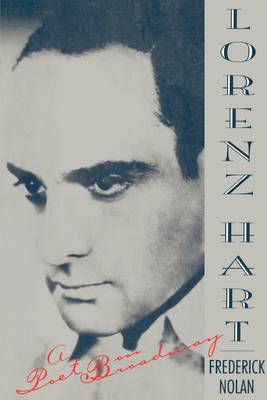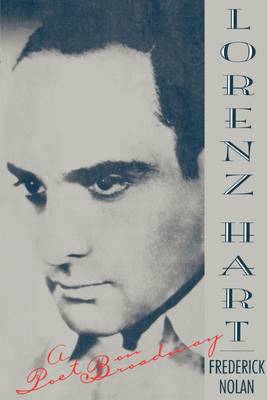
- Retrait gratuit dans votre magasin Club
- 7.000.000 titres dans notre catalogue
- Payer en toute sécurité
- Toujours un magasin près de chez vous
- Retrait gratuit dans votre magasin Club
- 7.000.0000 titres dans notre catalogue
- Payer en toute sécurité
- Toujours un magasin près de chez vous
Description
Lorenz Hart singlehandedly changed the craft of lyric writing. When Larry Hart first met Dick Rodgers in 1919, the commercial song lyric consisted of tired cliches and cloying Victorian sentimentality. Hart changed all that, always avoiding the obvious, aiming for the unexpected phrase that would twang the nerve or touch the heart. Endowed with both a buoyant wit and a tender, almost raw sincerity, Hart brought a poetic complexity to his art, capturing the everyday way people talk and weaving it into his lyrics. Songs had never been written like that before, and afterwards it seemed impossible that songs would ever be written any other way.
Lorenz Hart: A Poet on Broadway presents the public triumphs of a true genius of the American musical theatre, and the personal tragedies of a man his friend the singer Mabel Mercer described as "the saddest man I ever knew." Author Frederick Nolan began researching this definitive biography in 1968, tracking down and interviewing Hart's friends and collaborators one by one, including a remarkable conversation with Richard Rodgers himself. A veritable who's who of Broadway's golden age, including Joshua Logan, Gene Kelly, George Abbott and many more, recall their uncensored and often hilarious, sometimes poignant memories of the cigar-chomping wordsmith who composed some of the best lyrics ever concocted for the Broadway stage, but who remained forever lost and lonely in the crowds of hangers-on he attracted. A portrait of Hart emerges as a Renaissance and endearing bon vivant conflicted by his homosexuality and ultimately torn apart by alcoholism.
Nolan skillfully pulls together the chaotic details of Hart's remarkable life, beginning with his bohemian upbringing in turn of the century Harlem. Here are his first ventures into show business, and the 24-year-old Hart's first meeting with the 16-year-old Richard Rodgers. "Neither of us mentioned it," Rodgers later recalled, "but we evidently knew we would work together, and I left Hart's house having acquired in one afternoon a career, a best friend, and a source of permanent irritation." Nolan captures it all: the team's early setbacks, the spectacular hour long standing ovation for their hit song, "Manhattan," the Hollywood years (which inspired Hart to utter the undying line, "Just because you're paranoid doesn't mean the bastards aren't out to get you"), and the unforgettable string of hit shows that included "On Your Toes," "The Boys from Syracuse," and their masterpiece, "Pal Joey." But while success made Rodgers more confident, more musically daring, and more disciplined, for Hart the rounds of parties, wisecracks, and most of all drinking began to take more and more of a toll on his work. When Hart's unreliability forced Rodgers to reluctantly seek out another lyricist, Oscar Hammerstein II, and their collaboration resulted in the unprecedented artistic and commercial success of "Oklahoma," Hart never truly recovered.
Meticulously researched and rich with anecdotes that capture the excitement, the hilarity, the dizzying heights, and the crushing lows of a life on Broadway, Lorenz Hart is the story of an American original.
Lorenz Hart: A Poet on Broadway presents the public triumphs of a true genius of the American musical theatre, and the personal tragedies of a man his friend the singer Mabel Mercer described as "the saddest man I ever knew." Author Frederick Nolan began researching this definitive biography in 1968, tracking down and interviewing Hart's friends and collaborators one by one, including a remarkable conversation with Richard Rodgers himself. A veritable who's who of Broadway's golden age, including Joshua Logan, Gene Kelly, George Abbott and many more, recall their uncensored and often hilarious, sometimes poignant memories of the cigar-chomping wordsmith who composed some of the best lyrics ever concocted for the Broadway stage, but who remained forever lost and lonely in the crowds of hangers-on he attracted. A portrait of Hart emerges as a Renaissance and endearing bon vivant conflicted by his homosexuality and ultimately torn apart by alcoholism.
Nolan skillfully pulls together the chaotic details of Hart's remarkable life, beginning with his bohemian upbringing in turn of the century Harlem. Here are his first ventures into show business, and the 24-year-old Hart's first meeting with the 16-year-old Richard Rodgers. "Neither of us mentioned it," Rodgers later recalled, "but we evidently knew we would work together, and I left Hart's house having acquired in one afternoon a career, a best friend, and a source of permanent irritation." Nolan captures it all: the team's early setbacks, the spectacular hour long standing ovation for their hit song, "Manhattan," the Hollywood years (which inspired Hart to utter the undying line, "Just because you're paranoid doesn't mean the bastards aren't out to get you"), and the unforgettable string of hit shows that included "On Your Toes," "The Boys from Syracuse," and their masterpiece, "Pal Joey." But while success made Rodgers more confident, more musically daring, and more disciplined, for Hart the rounds of parties, wisecracks, and most of all drinking began to take more and more of a toll on his work. When Hart's unreliability forced Rodgers to reluctantly seek out another lyricist, Oscar Hammerstein II, and their collaboration resulted in the unprecedented artistic and commercial success of "Oklahoma," Hart never truly recovered.
Meticulously researched and rich with anecdotes that capture the excitement, the hilarity, the dizzying heights, and the crushing lows of a life on Broadway, Lorenz Hart is the story of an American original.
Spécifications
Parties prenantes
- Auteur(s) :
- Editeur:
Contenu
- Nombre de pages :
- 416
- Langue:
- Anglais
Caractéristiques
- EAN:
- 9780195102895
- Date de parution :
- 02-11-95
- Format:
- Livre broché
- Format numérique:
- Trade paperback (VS)
- Dimensions :
- 155 mm x 233 mm
- Poids :
- 607 g

Les avis
Nous publions uniquement les avis qui respectent les conditions requises. Consultez nos conditions pour les avis.






